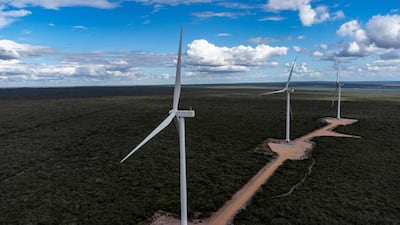Investment in clean energy is set to reach $1.7 trillion this year, outpacing spending on fossil fuels, as countries look to address potential energy shortages, the International Energy Agency has said.
Global energy investments in 2023 are projected to reach $2.8 trillion, with more than 60 per cent allocated for clean technologies, including renewables, electric vehicles, nuclear power and heat pumps, the Paris-based agency said in its World Energy Investment report on Thursday.
The remaining 40 per cent will be spent on coal, natural gas and crude oil, the report said.
“Clean energy is moving fast – faster than many people realise. This is clear in the investment trends, where clean technologies are pulling away from fossil fuels,” said Fatih Birol, the agency's executive director.
“For every dollar invested in fossil fuels, about $1.70 is now going into clean energy. Five years ago, this ratio was one-to-one,” said Mr Birol.
“One shining example is investment in solar, which is set to overtake the amount of investment going into oil production for the first time.”
Clean energy investment is set to rise by 24 per cent from 2021 to 2023, led by renewables and electric vehicles, while fossil fuel investment is projected to rise by 15 per cent in the same period, according to the agency.
However, more than 90 per cent of this increase is concentrated in advanced economies and China, posing a risk of energy disparity if clean energy transitions lag in other regions, it said.
Solar and other low-emission technologies will make up nearly 90 per cent of power generation investments, the agency said.
“Clean energy investments have been boosted by a variety of factors in recent years, including periods of strong economic growth and volatile fossil fuel prices that raised concerns about energy security, especially following Russia’s invasion of Ukraine,” it added.
Meanwhile, spending on upstream oil and gas is expected to rise by 7 per cent in 2023, returning to pre-pandemic levels, the agency said.
Despite record profits from higher crude prices, most fossil fuel producers allocated the cash flow to dividends, share buy-backs and debt repayment rather than reinvesting in supply.
“The few oil companies that are investing more than before the Covid-19 pandemic are mostly large national oil companies in the Middle East,” the report said.

Fossil fuel investment this year is expected to rise to more than double the levels needed in 2030 in the agency's net-zero emissions by 2050 scenario, it said.
Meanwhile, coal investment in 2023 is projected to be nearly six times higher than the estimated levels for 2030 in the net-zero scenario, which requires clean energy investment to rise to about $4 trillion by the end of the decade.
“The biggest shortfalls in clean energy investment are in emerging and developing economies. There are some bright spots, such as dynamic investments in solar in India and in renewables in Brazil and parts of the Middle East,” the IEA said.
“However, investment in many countries is being held back by factors including higher interest rates, unclear policy frameworks and market designs, weak grid infrastructure, financially strained utilities and a high cost of capital.”
Global investments in energy transition technologies must quadruple to $35 trillion by 2030 to stay in line with commitments made under the Paris climate agreement, according to the International Renewable Energy Agency.
Investments in renewable energy technologies reached a record $1.3 trillion last year but that figure must rise to about $5 trillion annually to meet the key Paris accord target of limiting temperature increases to 1.5°C above pre-industrial levels, the Abu Dhabi-based agency said in its World Energy Transitions Outlook 2023 preview in March.

